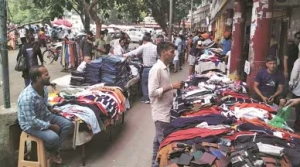Chandigarh – The Chandigarh Municipal Corporation (CMC) has announced the cancellation of 35 additional street vendor licenses due to non-payment of fees for February and March. This latest move adds to a series of actions taken by the Chandigarh Municipal Corporation to regulate street vending and enforce a strict fee payment structure. Earlier this year, the corporation had already revoked over 6,800 licenses for similar violations. While these actions may appear harsh, they are part of a broader initiative to bring order and transparency to street vending in Chandigarh.
This article explores the reasons behind these cancellations, the impact on street vendors, and the CMC’s ongoing efforts to regulate the sector, including the introduction of geotagging and QR-enabled vending cards.
Cancellations Mount as Street Vendors Fail to Pay Fees
In recent months, Chandigarh Municipal Corporation has ramped up its efforts to regulate street vending by targeting non-compliant vendors. The cancellation of 35 more licenses for failure to pay vending fees for February and March comes on the heels of earlier actions that saw over 6,800 licenses revoked. The Chandigarh Municipal Corporation decision is part of a broader strategy to ensure that street vendors contribute their fair share to the city’s urban development while adhering to established regulations. The payment of fees is a critical component of the CMC’s efforts to maintain order and cleanliness in Chandigarh’s streets.
The licenses that were canceled were primarily for vendors who had failed to submit their fee payments on time. These fees are used to cover the costs of maintaining public spaces, including sanitation services, infrastructure, and vendor regulation. By imposing stricter rules on non-payment, the Chandigarh Municipal Corporation aims to send a clear message to street vendors that compliance with municipal guidelines is mandatory.
The Impact of License Cancellations on Vendors
For many street vendors, the cancellation of their licenses represents a significant loss of income. Vendors in Chandigarh rely on their stalls to make a living, and the removal of their ability to operate legally leaves them with few options. While the Chandigarh Municipal Corporation actions may be viewed as a necessary step to maintain order in the city, the repercussions for vendors who are unable to pay their fees can be harsh.

In many cases, vendors who are unable to meet the payment requirements face significant financial strain. These vendors often work in the informal sector, where income can be unpredictable. Furthermore, some vendors may not have access to the same financial resources as larger businesses, making it difficult for them to pay the required fees on time. As a result, these vendors face the risk of losing their livelihoods altogether.
Addressing the Issue of Informal Street Vending
Street vending has long been a part of Chandigarh’s urban landscape, providing affordable goods and services to local residents. However, the informal nature of street vending has also led to challenges in terms of regulation and management. Vendors often operate without proper documentation, making it difficult for the municipal authorities to track their activities and enforce compliance with local laws.
The rise of informal street vending has contributed to concerns about public safety, cleanliness, and the efficient use of public spaces. Vendors who fail to pay the required fees can also contribute to congestion and waste, making it harder for local authorities to maintain the city’s cleanliness. Additionally, some street vendors operate without proper licenses, which can result in overcrowding and unfair competition among vendors.
To address these issues, the Chandigarh Municipal Corporation has been working on a comprehensive plan to regulate street vending more effectively. This includes the introduction of new technologies, such as geotagging and QR-enabled vending cards, which aim to streamline the licensing process and reduce instances of non-compliance.
The Role of Geotagging and QR-Enabled Vending Cards


As part of its ongoing efforts to regulate street vending, the Chandigarh Municipal Corporation has introduced a new system that leverages technology to monitor and manage street vendors. Geotagging and QR-enabled vending cards are at the heart of this initiative, allowing the CMC to track the location and activities of vendors in real-time.
The geotagging system enables the Chandigarh Municipal Corporation to pinpoint the exact location of each vendor, ensuring that they are operating within the designated vending zones. This not only helps to reduce overcrowding and maintain order but also makes it easier for municipal authorities to enforce regulations related to street vending.
The QR-enabled vending cards, on the other hand, provide vendors with a unique identification number that can be scanned by Chandigarh Municipal Corporation officials to verify their compliance with local laws. These cards also serve as proof of payment, allowing vendors to demonstrate that they have paid their fees and are operating legally. The combination of geotagging and QR-enabled cards makes it easier for the CMC to track vendors and ensure that they are adhering to the necessary regulations.
Why Technology Is Key to Regulating Street Vending?
The introduction of geotagging and QR-enabled vending cards is a key part of the CMC’s broader strategy to regulate street vending in Chandigarh. Technology plays a crucial role in modernizing the way the city manages its public spaces and ensures that street vendors contribute to the city’s development.
By utilizing technology, the CMC can streamline the licensing process, reduce instances of fraud, and ensure that vendors are operating within designated areas. This makes it easier to maintain public order and cleanliness, while also providing vendors with a more efficient way to comply with regulations.
Furthermore, the use of technology can help the CMC identify areas where street vending is overcrowded or where vendors are not adhering to the rules. This information can be used to make data-driven decisions about where to allocate resources and how to improve the overall vending experience in Chandigarh.
The Challenges of Implementing New Regulations
While the Chandigarh Municipal Corporation’s efforts to regulate street vending through technology are a step in the right direction, they also present a number of challenges. One of the biggest obstacles is ensuring that all street vendors have access to the necessary technology, such as smartphones and internet connectivity, to comply with the new regulations.
Additionally, there may be resistance from some vendors who are used to operating informally and may be reluctant to adopt new technologies or pay fees. Overcoming this resistance will require effective communication and education about the benefits of the new system for both vendors and the community at large.
Finally, the Chandigarh Municipal Corporation will need to ensure that its regulatory framework is flexible enough to accommodate the diverse needs of street vendors, who come from various socio-economic backgrounds and have different levels of access to resources.
The Future of Street Vending in Chandigarh

The Chandigarh Municipal Corporation’s recent actions highlight the growing importance of regulating street vending in urban areas. As cities continue to grow and evolve, the need for effective management of public spaces becomes increasingly urgent. The introduction of geotagging and QR-enabled vending cards by Chandigarh Municipal Corporation is just one example of how technology can be used to improve the efficiency and transparency of city management.
Looking ahead, it is likely that other cities in India and around the world will adopt similar strategies to regulate street vending. By embracing technology and implementing clear, fair regulations, municipalities can help ensure that street vendors contribute to the urban economy while maintaining public order and cleanliness.
Legal Framework and Vendor Rights Under the Street Vendors Act, 2014
The regulation of street vending in Chandigarh and other parts of India is guided by the Street Vendors (Protection of Livelihood and Regulation of Street Vending) Act, 2014. This central law aims to protect the rights of street vendors while also regulating their activities to avoid public inconvenience. According to the Act, urban local bodies like the Chandigarh Municipal Corporation are empowered to issue vending licenses and ensure compliance through regular monitoring.
The Town Vending Committees (TVCs), formed under this Act, are responsible for identifying vending zones, verifying vendors, and overseeing grievance redressal. However, the recent license cancellations raise questions about the efficiency of the TVCs and whether the decisions are made with due consideration to the economic hardships of vendors.
In the current context, the Chandigarh Municipal Corporation street vendors are being impacted by enforcement actions that, while legally justified, may not always offer adequate avenues for appeal or relief. This has prompted debates on whether a more balanced approach—one that combines regulation with rehabilitation—should be adopted.
Street Vending and Urban Planning in Chandigarh
Chandigarh was designed as a planned city with clearly demarcated commercial and residential zones. However, the evolution of the city’s economy and the rising population have led to a steady increase in informal businesses, including street vending. As a result, certain sectors and marketplaces have become hotspots for unauthorized vending, leading to congestion, sanitation concerns, and clashes with law enforcement.
In response, the Chandigarh Municipal Corporation street vendors initiative aims to bring structure and order to these public spaces. The creation of dedicated vending zones, supported by digital infrastructure like QR codes and geotagging, is intended to integrate vendors into the city’s urban planning framework. This approach allows the city to balance commercial needs with public accessibility and hygiene standards.
Still, critics argue that some vending zones are poorly located, lacking footfall or basic amenities like water and waste disposal. This pushes vendors back into high-traffic areas where they risk license cancellation. Therefore, a more collaborative planning effort involving vendors, citizens, and urban designers is necessary to make the initiative truly inclusive.
Also Read: Tahawwur Hussain Rana’s Extradition from US to India After 17 Years of 26/11 Attack
Case Studies of Vendors Affected by License Cancellations
To understand the impact of recent developments, we spoke to several vendors affected by the recent license revocations. One vendor, who had been operating a food stall in Sector 17 for over a decade, revealed that despite applying for a new QR-enabled vending card, he had not received any communication from the authorities. Without a valid license, he was asked to vacate the area.


Another vendor, a woman selling hand-crafted jewelry in Sector 22, mentioned that the monthly vending fee, while nominal for some, had become unaffordable due to declining foot traffic and inflation. She had missed two payments, leading to the cancellation of her license. Like many others, she had no idea how to contest the cancellation or reinstate her status.
These stories highlight the disconnect between policy implementation and on-ground realities. While the Chandigarh Municipal Corporation street vendors policy framework is robust on paper, execution gaps are leaving vulnerable vendors without a livelihood.
Digital Transformation and Its Effect on Vendor Accountability
The integration of digital tools has become central to the CMC’s strategy. With geotagging, authorities can locate and monitor each vendor’s exact position within their allotted zone. QR-enabled vending cards allow instant verification of fee payments, license validity, and even customer feedback in some cases.
This digital transformation is beneficial in many ways. It reduces paperwork, curbs corruption, and increases transparency. For instance, a CMC official can now scan a vendor’s card and immediately know whether they are in compliance with regulations. Moreover, the database of Chandigarh Municipal Corporation street vendors is now more up-to-date, making enforcement easier.
However, challenges remain. Digital literacy among vendors is low. Many do not own smartphones or know how to use QR codes. Without proper training and support, these tools may alienate the very people they are meant to help. The CMC must ensure that the transition to digital vending systems includes education campaigns and technical assistance.
Revenue Generation and Financial Accountability
The vending fee collected from licensed vendors serves as a significant revenue stream for the city’s municipal administration. These funds are often reinvested into civic amenities, sanitation, and urban development. According to the latest budget estimates, vending fees contribute several crores annually to the CMC’s coffers.
When vendors fail to pay these fees, it creates a budgetary shortfall that impacts public services. The recent cancellation of licenses for 35 non-paying vendors highlights the need for consistent revenue collection. At the same time, the Chandigarh Municipal Corporation street vendors enforcement must not overshadow the need for inclusivity and economic support.
Experts recommend implementing a sliding fee system based on the vendor’s category, area, and turnover. This would allow smaller or struggling vendors to continue operating legally while ensuring the city still receives necessary funding.
Civil Society Response and Legal Appeals
Civil society organizations have begun to take notice of the hardships faced by street vendors. Several NGOs working in urban development and informal labor have raised concerns about the abrupt nature of the license cancellations. They have called for better communication, formal appeals processes, and temporary relief measures for vendors facing genuine hardships.
In some cases, legal notices have been issued to challenge what is seen as an overreach by municipal authorities. These groups argue that the Chandigarh Municipal Corporation street vendors initiative needs to align more closely with constitutional protections for the right to livelihood.
Activists have also suggested the formation of independent grievance redressal forums where vendors can present their cases. These forums would act as intermediaries between the CMC and the vendor community, promoting transparency and fairness in administrative decisions.
Vendor Associations and Collective Bargaining
Recognizing the need for a unified voice, many vendors have joined or formed associations to represent their interests. These groups serve as platforms for collective bargaining, legal aid, and negotiation with the Chandigarh Municipal Corporation. In some sectors of Chandigarh, these associations have been successful in delaying enforcement actions or securing grace periods for fee payment.
The Chandigarh Municipal Corporation street vendors ecosystem can benefit greatly from structured vendor associations. They provide a channel for two-way communication between the authorities and street vendors, improving the effectiveness of regulations while minimizing conflict.
Encouraging more vendors to join these associations could help bridge the trust deficit between the two groups. Associations can also help with training and digital onboarding, increasing the success rate of new technologies like QR-enabled vending cards.
Comparing Chandigarh’s Street Vending Policy with Other Cities
Several Indian cities have faced similar challenges in regulating street vending. Mumbai, Delhi, and Ahmedabad have each implemented different approaches to managing their informal markets. For example, Mumbai has created formal vendor zones near railway stations, complete with sanitation facilities and mobile payment options.
In contrast, Delhi uses a lottery-based system to allocate vending spots, ensuring fairness and reducing overcrowding. Ahmedabad’s model is considered one of the most vendor-friendly, providing low-interest loans and insurance to registered vendors.
Compared to these cities, the Chandigarh Municipal Corporation street vendors policy is still evolving. Its recent actions suggest a strong emphasis on enforcement, but with limited emphasis on vendor welfare. To become a national model, Chandigarh must adopt best practices from these cities and integrate them into its regulatory framework.
Citizen Perspectives and Public Opinion
Chandigarh residents have mixed views about street vending. While many appreciate the affordability and convenience that vendors offer, others complain about encroachments, noise, and sanitation issues. Residents in busy sectors often report that sidewalks and public spaces are blocked, making movement difficult.
Public sentiment plays a crucial role in shaping municipal policy. The success of the Chandigarh Municipal Corporation street vendors regulation depends not just on compliance from vendors but also on support from the public. Citizens must be educated about the role of licensed vendors in the economy and how organized vending improves city aesthetics and safety.
Creating awareness campaigns about the benefits of regulated vending—such as cleaner markets, organized stalls, and better products—can foster public support for inclusive policies.
Recommendations for a Balanced Street Vending Policy
To create a truly sustainable street vending ecosystem, the Chandigarh administration must adopt a balanced policy that ensures both regulation and inclusivity. Key recommendations include:
-
Introduce flexible fee structures based on vendor income.
-
Provide digital literacy training to help vendors adapt to new technologies.
-
Create independent appeal mechanisms for contested license cancellations.
-
Increase the number of dedicated vending zones with basic amenities.
-
Encourage vendor associations to participate in policy-making.
-
Launch public awareness campaigns on the importance of regulated vending.
These steps will help the Chandigarh Municipal Corporation street vendors policy evolve into a model for other cities across India.
Final Word: A Critical Moment for Street Vendors in Chandigarh
The Chandigarh Municipal Corporation stands at a pivotal moment in its management of street vending. While the cancellation of 35 licenses may seem like a minor administrative move, it reflects broader issues related to urban planning, technology adoption, and livelihood security.
The future of the Chandigarh Municipal Corporation street vendors depends on policies that are not only strict but also compassionate. Regulation must be paired with support systems, infrastructure development, and digital training to ensure that vendors are not just surviving—but thriving—in the modern cityscape.

